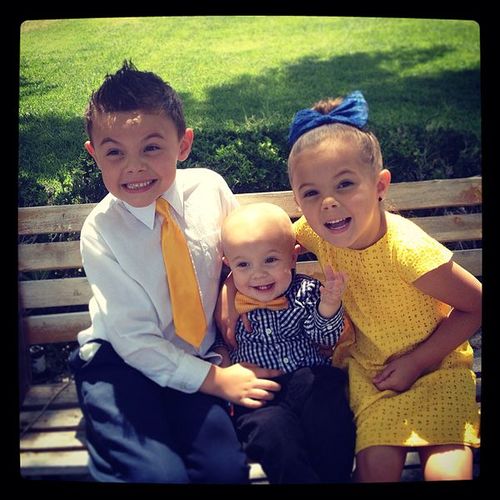Mathematicians and their sons
 I got this problem from a book. It was and still is one of my absolute favorite problems of all time.
I got this problem from a book. It was and still is one of my absolute favorite problems of all time.
Two mathematicians meet at a coffee shop.
"You have three sons, correct?" Bob says, "what are their ages?"
"The product of their ages is 36" says Bill, " and the sum of their ages is today's date"
"Well, I know the date" bob says, "but that doesn't tell me how old your children are"
"Oh, I forgot to tell you," Bill says, "my youngest one has red hair"
"Ahh, thank you, now I know how old they are" bob replies.
What is the sum of Bill's children's ages?
Assumption/hint: Assume if two children are of the same age, they are born on the same date.
Image credit: Wikipedia Sloan hadfield
The answer is 13.
This section requires Javascript.
You are seeing this because something didn't load right. We suggest you, (a) try
refreshing the page, (b) enabling javascript if it is disabled on your browser and,
finally, (c)
loading the
non-javascript version of this page
. We're sorry about the hassle.
2 solutions
This is one of my favorite math riddles. Thanks for sharing!
why must the day be 13th?
Log in to reply
becuase its the only day in which there are two possible answers. If the date were any other, then the mathematician would know the sons ages.
Log in to reply
Surely, IF the date were any other, then the mathematician would NOT know the sons ages - rows 2,3, 4, 5 or 8 could be the answer
Log in to reply
@Jerry Hollands – .... zoo ops! ....... rows 2,3, 4, 5 or 7 could be the answer
Log in to reply
@Jerry Hollands – If the date were anyother, then he would know what ages Bill's sons were because there are only one possible group of ages per date. He knows the date aswell
Co-incidentally, 2 + 2 + 9 equals 1 3 as well!
Log in to reply
But then there would be no UNIQUE youngest son..
Log in to reply
I know that. But even if you change 'youngest' into 'oldest', the answer the remains the same. That is what I was trying to point out.
Log in to reply
@Mursalin Habib – 13, the date and also the sum, remains the same if the reply were "my oldest" but then guesser could figure out the answers.
Nice Problem!
How did you create that table in latex?
Log in to reply
Here is the latex
\begin{array}{l|c|r}\text{son 1} & \text{son 2}& \text{son 3} & \text{product} & \text{sum} \ \hline 1 & 1 & 36 &36&38\ \hline 1&2&18&36&21 \ \hline 1&3&12&36&16 \ \hline 1&4&9&36&14 \ \hline 1&6&6&36&13 \ \hline 2&2&9&36&13 \ \hline 2&3&6&36&11 \ \hline 3&3&4&36&10\end{array}\
@Stewart Feasby It's an ARRAY and you can find it on this wikipedia page
really a good riddle.
Hi. is 13 the answer because it has the highest probability.
Log in to reply
No, it's because that's the not possible day with two birthdays, if the mathematician knows the date, he would have known when the children were born since there is one combo per one.
The hint suggested that two of the children must be the same age. This problem would not have a single solution without that assumption. The comment about the youngest son suggested he was uniquely the youngest.
Putting these two together, the only age combination that would work would involve the two older children having the same age and a single youngest child are 1, 6, and 6. The ages of 1, 6, 6 are the only ages that yield 1 * 6 * 6 = 36 that are consistent with the two clues we were given. Adding 1+6+6 = 13
There are 8 possibilities for the age products to be 36.
son 1 1 1 1 1 1 2 2 3 son 2 1 2 3 4 6 2 3 3 son 3 3 6 1 8 1 2 9 6 9 6 4 product 3 6 3 6 3 6 3 6 3 6 3 6 3 6 3 6 sum 3 8 2 1 1 6 1 4 1 3 1 3 1 1 1 0
Since Bob didn't know their ages with just the knowledge of the age product and sum, the day must be the 13th since it is the only day with with two possible ages. Finally, since there is a youngest son, the 2,2,9 option can be ruled out since two are the same age and there is no youngest son. Thus the only possibility left is 1 , 6 , 6